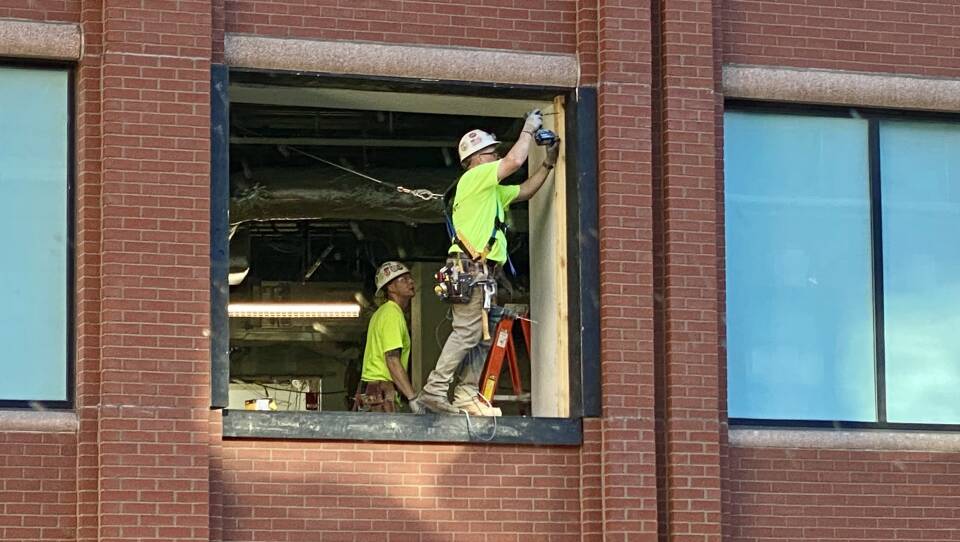This is a web edition of GBH Daily, a weekday newsletter bringing you local stories you can trust so you can stay informed without feeling overwhelmed.
☀️Sunny and clear, with highs in the 70s. Sunset is at 7:05 p.m.
Ever wonder why so many dogs and cats up for adoption in Boston-area shelters come from the South? GBH’s Meghan Smith and her dog Coco, an Alabama transplant with very cute ears, decided to find out.
Turns out it’s a combination of factors — from more robust programs that help people afford spaying and neutering their pets, to New England’s colder climate, which makes it harder for animals to survive as strays.
“We definitely have had overpopulation in all parts of the country,” said Seana Dowling-Guyer, associate director of the Collaborative for Shelter Dogs at the Tufts Cummings School of Veterinary Medicine. “But with some concerted efforts and funding for spay-neuter programs in the Northeast, California and Northwest, they’ve made great progress in reducing overpopulation.”
And with fewer local strays, shelters here have more space and people to help out animals that come from other parts of the country. You can watch the full video here and show Coco some love.
Four Things to Know
1. A federal judge in Boston is considering a lawsuit brought by Massachusetts and 16 other states challenging the Trump administration’s decision to halt all new permits for wind power. An attorney for the government argued that the administration is not prohibiting all permits, but requiring reviews of new projects.
“The president doesn’t get to supersede the law of the land and just say, y’all stop permitting stuff,” said Marguerite Wells with the Alliance for Clean Energy New York, another plaintiff. “The law of the land says permits have to be issued according to a set of rules, and if you want to change those rules, you can, but there’s a process for changing the rules.”
2. Boston City Councilor Tania Fernandes Anderson was sentenced to one month in jail and three years of supervised release after pleading guilty to charges of wire fraud and theft.
Fernandes Anderson, who resigned from the council in July, was accused of hiring a family member, giving that person a bonus and taking back $7,000 in cash.
3. A group of scientists in Woods Hole has developed a way to gather more data on coastal erosion and restoration — and to get more people involved in science. By installing cell phone mounts and QR codes at beaches, they’re enabling anyone with a smartphone to contribute to research.
“Put the phone in the cradle. Take a photo. Scan the QR code; it brings you right to the web page. You drop it in, hit submit, you’re good to go,” said Bryan McCormack, the Coastal Process Specialist for Woods Hole Oceanographic Institution Sea Grant. You can find these CoastSnap mounts at Town Neck Beach in Sandwich, State Beach in Oak Bluffs, Hummock Pond Road on Nantucket, Linnell Landing in Brewster and Mariner’s Memorial Way in New Bedford. You can also see the photos people have submitted at CoastSnap.com.
4. Election Day is tomorrow for Boston’s mayoral and city council primary races. On Friday, a group of voting rights advocates visited the Suffolk County Jail and the county’s House of Correction to help people who are awaiting trial, or serving time for misdemeanors, request and submit their absentee ballots. They also gathered signatures for a ballot initiative that would ask voters to restore voting rights to people incarcerated for felony convictions.
“My point today was just to encourage them,” State Rep. Russell Holmes said. “They asked me to get the mayoral candidates over here after we know who the final two are — we’ll see who they are and I’m trying my best to get them over here.”
Massachusetts lags in housing production despite units added in Healey’s term
State officials estimate we’ll need about 220,000 new homes and apartments by 2035 to keep up with demand. So it’s time for a status check: how is Massachusetts doing on housing production?
Gov. Maura Healey’s administration has said it has either built or approved about 90,400 permits since the governor took office in 2023, according to the State House News Service. Let’s break that down: that includes 63,100 units already on the market, 18,300 under construction, 3,600 funded through the Executive Office of Housing and Livable Communities and another 5,400 proposed and privately financed.
And while cities and towns here issued 14,338 building permits in 2024, that works out to 201 permits for every 100,000 residents, which is the sixth-lowest rate in the nation, according to an analysis from a Pioneer Institute group called U.S. Data Labs.
“I’m focused every day on building more housing,” Healey told Bloomberg News last week. “Through tax credits for developers, changes to the law to make accessory dwelling units available by right, mill-to-housing conversions, office-to-housing conversions and surplus state land, we’re making real progress. We started with a deficit of 220,000, and a year and a half in, we now have over 90,000 housing starts underway.”
Read the full report from the State House News Service here.
Dig deeper:
-A veterans housing project almost fell through amid funding cuts and tariffs
-New England’s first public housing complex is getting a makeover
-To fix Massachusetts’ housing crisis, we need to build. Here’s why that’s hard.





